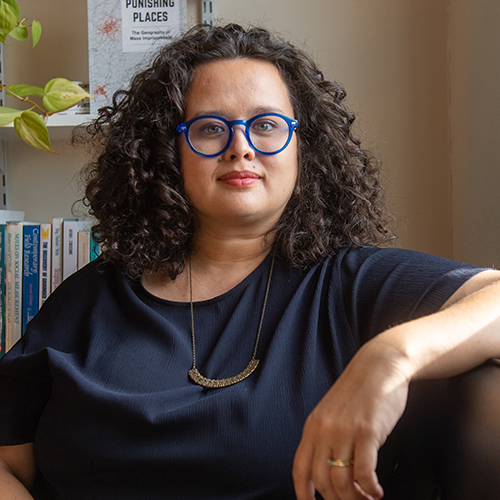BU’s 5 NSF Grant Winners Are Changing Conversations in Robotics, Computing, Mass Incarceration, Neurology, and More
Excerpt from The Brink | By: Jessica Colarossi | June 23, 2023
Behind their research on topics ranging from mass incarceration to the brain and lungs to delivery robots, five experts and scientists at Boston University have received Faculty Early Career Development Program (CAREER) awards from the National Science Foundation (NSF) to advance scientific research in their fields. The researchers receiving the awards are also laying the foundation for the next generation of scientists by using the funding to support students and youth educational programs and to diversify STEM.
A respected program that is highly competitive, NSF CAREER awards mark a significant achievement for early-career scientists. The Brink caught up with each of BU’s latest award recipients to see what they are working on.
Jessica Simes

The United States has the highest incarceration rate in the world, a sobering statistic that has been in the making since the 1970s, when federal policies lengthened time in prison and sought tougher sentencing on crimes. Strikingly, studies have found that Black Americans are six times as likely to be incarcerated as white people, and about three times as likely as Latino/a populations.
Jessica Simes, assistant professor of sociology at the College of Arts & Sciences, studies racial inequality, mass incarceration, and the social structure of cities, uncovering the often hidden patterns and reverberating impacts policing and imprisonment has had on communities. She specifically studies mass incarceration based on zip codes, and has found that incarceration has changed across the 50 years of mass imprisonment in the US: In the 1970s and 1980s, incarceration rates for both jail and prison were very concentrated in large urban cities. Today, rates are highest in small cities and communities outside of the urban areas.
Her NSF CAREER award will support a set of research projects and educational initiatives that explore the underlying causes and effects of mass incarceration within communities and neighborhoods across the United States.
“Mass incarceration as a collection of policies and practices remains one of the most important ways we see how structural racism and social inequality persist as a result of public policy,” Simes says.
This research is a culmination from when Simes was in graduate school, noticing that much of the existing research underappreciated the role that place—neighborhoods and community conditions—helped explain the causes and consequences of mass incarceration. This eventually led to her book, titled Punishing Places: The Geography of Mass Imprisonment, and this CAREER project.
Her objective is to examine how disparities in residential conditions, like housing, segregation, and economic factors, contribute to differences in incarceration rates and outcomes. The project will also explore how various interconnected aspects of the criminal justice system, ranging from police interactions to imprisonment, cumulatively affect community well-being and political participation. Additionally, Simes is starting the Open Justice Lab, which will facilitate the collection, processing, and analysis of data, accompanied by an interdisciplinary educational program consisting of courses, practicums, and symposia. She hopes that the research and educational components will boost participation of underserved students in STEM fields, and offer valuable insights for policymakers, community-based initiatives, and the general public.
“By the end of the project, I hope to provide new insights into the role of place, race, and inequality in high rates of and disparities in incarceration, and also new understandings of how community-level exposures to the criminal justice system matter for health and political participation,” she says. “I am passionate about using this award to build bridges: bringing together social science and data science, practitioners and researchers, and universities and community leaders, and, in doing so, we will collectively identify critical research needs, share technical and subject-matter expertise, and create meaningful and impactful research that can inform policy reform and social change.”